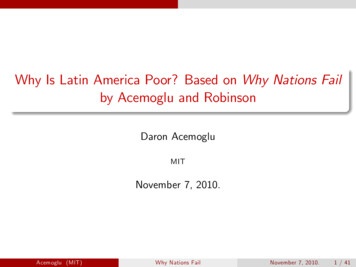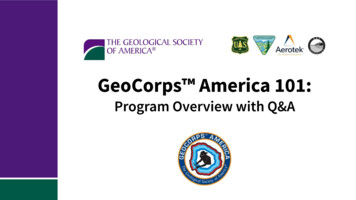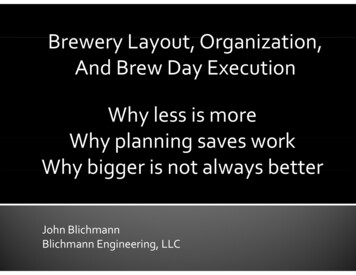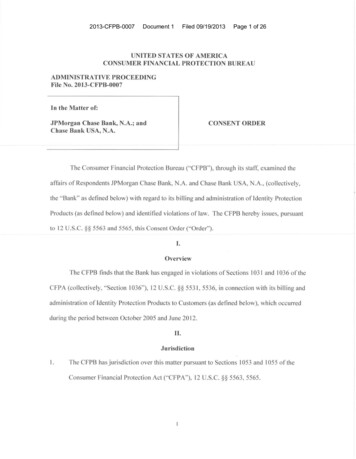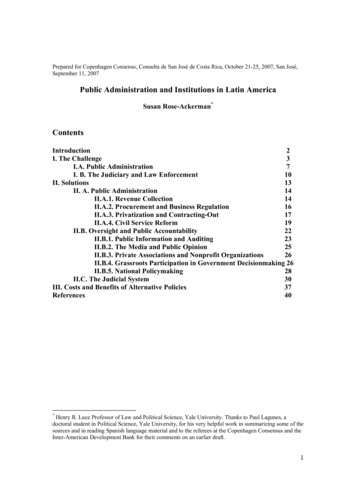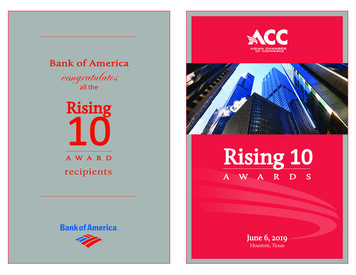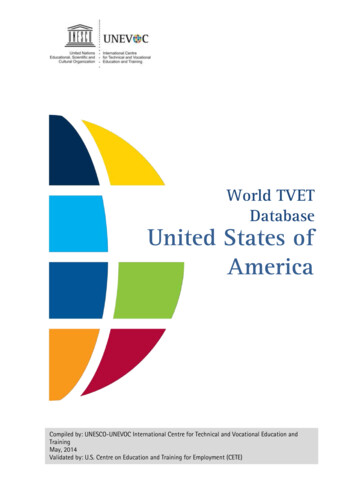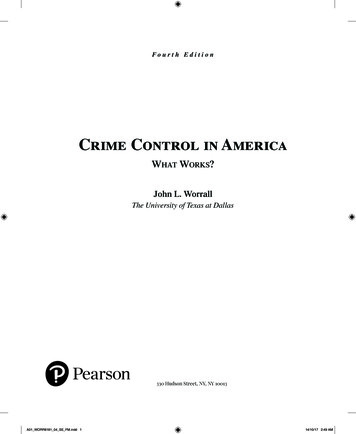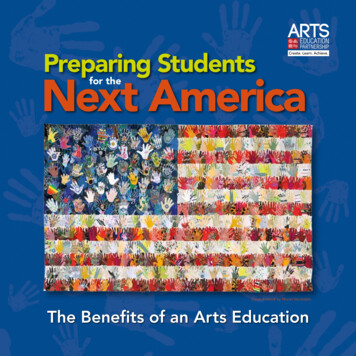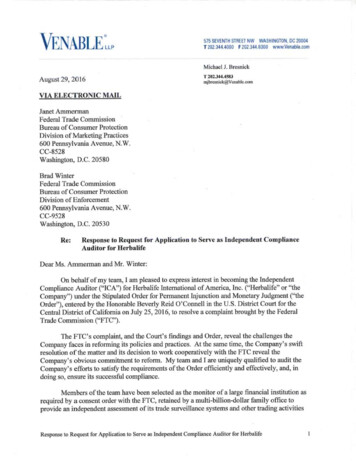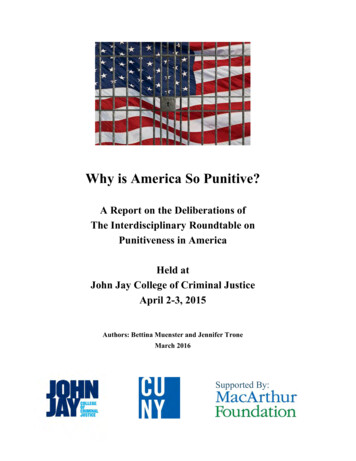
Transcription
Why is America So Punitive?A Report on the Deliberations ofThe Interdisciplinary Roundtable onPunitiveness in AmericaHeld atJohn Jay College of Criminal JusticeApril 2-3, 2015Authors: Bettina Muenster and Jennifer TroneMarch 2016Supported By:
AcknowledgementsWe would like to express our gratitude to the John D. and Catherine T. MacArthur Foundationwhich has a long history supporting research that leads to social change. In this instance, theFoundation hoped that a cross-pollination of perspectives could unpack the phenomenon ofpunitiveness in the operations of the American criminal justice system and, more importantly,illuminate the path forward to a more humane and effective response to crime. The Roundtable thusjoins a larger portfolio of research and programmatic initiatives at MacArthur that are designed tofind ways to reduce America’s reliance on incarceration while promoting public safety and justice.About UsThe John D. and Catherine T. MacArthur Foundation supports creative people, effectiveinstitutions, and influential networks building a more just, verdant, and peaceful world. MacArthur isplacing a few big bets that truly significant progress is possible on some of the world’s most pressingsocial challenges, including over-incarceration, global climate change, nuclear risk, and significantlyincreasing capital for the social sector. In addition to the MacArthur Fellows Program, theFoundation continues its historic commitments to the role of journalism in a responsible andresponsive democracy; the strength and vitality of our headquarters city, Chicago; and generatingnew knowledge about critical issues.MacArthur is one of the nation's largest independent foundations. Organizations supported by theFoundation work in about 50 countries. In addition to Chicago, MacArthur has offices in India,Mexico, and Nigeria.John Jay College of Criminal Justice of The City University of New York is an internationalleader in educating for justice, offering a rich liberal arts and professional studies curriculum toupwards of 15,000 undergraduate and graduate students from more than 135 nations. In teaching,scholarship and research, the College approaches justice as an applied art and science in service tosociety and as an ongoing conversation about fundamental human desires for fairness, equality andthe rule of law.John Jay is a community of motivated and intellectually committed individuals who explore justicein its many dimensions. The College’s liberal arts curriculum equips students to pursue advancedstudy and meaningful, rewarding careers in the public, private, and non-profit sectors. Itsprofessional programs introduce students to foundational and newly emerging fields and preparethem for advancement within their chosen professions.1
Author BiosBettina Muenster is the Executive Associate for Research and Special Project to President JeremyTravis at John Jay College. In that position she manages the President’s speeches, testimonies andpublications, functions as liaison to internal and external stakeholders, coordinates various eventsand initiatives, and directs the prestigious Presidential Internship Program. In the past, she hasworked part time as Research Assistant for the Center for Court Innovation, conducted researchunder the supervision of JJC Presidential Scholar, Scott Atran, and as Research Assistant for CharlesB. Strozier, Director of the Center on Terrorism at John Jay. Ms. Muenster graduated from John JayCollege with a BA/MA degree in Forensic Psychology and a Masters Certificate in TerrorismStudies in 2006.Jennifer Trone has more than 20 years of professional experience in the nonprofit sector,helping organizations use communications strategically to spread insights, influence and inspireothers, and garner support. Working as a consultant since 2008, her clients include nonprofitorganizations, government agencies, foundations and academic institutions. She also serves onthe Board of Directors of Skylight, a human rights media organization. Prior to workingindependently, Jennifer was Communications Advisor to the first Prosecutor of the InternationalCriminal Court, Communications Director of the Commission on Safety and Abuse in America’sPrisons, and before that, a senior staff member at the Vera Institute of Justice.2
Roundtable ParticipantsVanessa Barker, Associate Professor ofSociology at Stockholm UniversityKatherine Beckett, Professor in theDepartment of Sociology and Law,Societies, and Justice Program at theUniversity of WashingtonTodd Clear, Provost at RutgersUniversity-NewarkAnne-Marie Cusac, Associate Professorof Journalism, College of Arts andSciences at Roosevelt University,Chicago, and contributing writer of TheProgressiveJonathan Jacobs, Professor ofPhilosophy and Director of the Instituteof Criminal Justice Ethics at John JayCollege of Criminal JusticeMichael Jacobson, Director of theCUNY institute for State and LocalGovernance (ISLG)Jan de Keijser, Professor ofCriminology at the Institute of CriminalLaw and Criminology and AssociateEditor of the European Journal ofCriminologyAlan Page Fiske, PsychologicalAnthropologist at UCLAGlenn C. Loury, Merton P. StoltzProfessor of Social Sciences andProfessor of Economics at BrownUniversityMark Fondacaro, Professor ofPsychology at John Jay College ofCriminal JusticeShadd Maruna, Dean and Professor atthe School of Criminal Justice at RutgersUniversity-NewarkLaurie R. Garduque, Director forJustice Reforms (U.S.) for the John D.and Catherine T. MacArthur FoundationTracey L. Meares, Walton HaleHamilton Professor at Yale Law SchoolDavid Garland, Professor of Sociologyand Law at New York UniversityMarie Gottschalk, Professor of PoliticalScience at the University ofPennsylvaniaDavid A. Green, Assistant Professor ofSociology at John Jay College ofCriminal JusticeMaria Hartwig, Associate Professor ofPsychology at John Jay College ofCriminal JusticeJudge Morris B. Hoffman, Appointedto the Denver District Court in December1990James Morone, John Hazen WhiteProfessor of Political Science and PublicPolicy at Brown University where he isthe director of their Taubman PublicPolicy ProgramStephen J. Morse, Ferdinand WakemanHubbell Professor of Law, Professor ofPsychology and Law in Psychiatry, andthe Associate Director of the Center forNeuroscience & Society at the Universityof PennsylvaniaKhalil Gibran Muhammad, VisitingProfessor of History at The GraduateCenter, CUNY and the Director of theSchomburg Center for Research in BlackCulture at the New York Public LibraryDouglas N. Husak, Professor ofPhilosophy at Rutgers UniversityNaomi Murakawa, Associate Professorof African Studies at PrincetonUniversityJonathan Jackson, Professor ofResearch Methodology and a member ofthe Mannheim Centre for Criminology atthe London School of EconomicsChristian Pfeiffer, Director of theCriminological Research Institute ofLower SaxonyJulian Roberts, Professor ofCriminology at the Centre forCriminology, Faculty of Law at OxfordUniversity and a member of theSentencing Council of England andWalesAndrew Skotnicki, Professor ofChristian Ethics at Manhattan College inNew YorkSonja Snacken, Professor ofCriminology, Penology, and Sociologyof Law at the Vrije Universiteit Brussel(Belguim)Michael Tonry, McKnight PresidentialProfessor of Criminal Law and Policy,Director of the Institute on Crime andPublic Policy of the University ofMinnesota, and Scientific Member ofMax Planck Institute on Comparativeand International Criminal Law inFreidburg, GermanyJeremy Travis, President of John JayCollege of Criminal JusticeNicholas Turner, President and Directorof the Vera Institute of JusticeTom R. Tyler, Macklin FlemingProfessor of Law and Professor ofPsychology at Yale Law SchoolBruce Western, Professor of Sociologyand Director of the Malcolm WienerCenter for Social Policy at the HarvardKennedy School of GovernmentJames Q. Whitman, Ford FoundationProfessor of Comparative and ForeignLaw at Yale Law SchoolCathy Spatz Widom, DistinguishedProfessor in the Psychology Departmentat John Jay College of Criminal Justiceand a member of the Graduate Centerfaculty at the City University of NewYorkHoward Zehr, widely known as “thegrandfather of restorative justice,” Codirector of the new Zehr Institute forRestorative Justice3
Table of Contents:Acknowledgements & About Us . 1Author Bios .2Roundtable Participants 3Table of Contents .4Introduction by President Jeremy Travis.5-8Section I – An Unprecedented Opportunity for Change .9-11Section II – The Great Build Up: How Did We Get Here? .11-14Section III – Punishment through the Lens of History: Racism in America 14-17Section IV – American Exceptionalism: A Comparative Approach 17-23Section V – The Psychology of Punishment: On Blame and Responsibility .23-27Section VI – The Role of Religion: Retribution versus Forgiveness .27-29Section VII – Making Policy: The Power and Limitations of Data .29-33Section VIII – Conclusion: An Emerging Movement in a Challenging Time . .33-354
March 2016Dear colleagues:In April 2015, a remarkable group of 32 national and international scholars met at John Jay Collegefor two days to address a complex and profound question: “Why is America so punitive”?This question comes at a critical time in American history. A new national consensus seems to beemerging that America should reduce its levels of incarceration, reform police practices, cut back onthe extent of criminal justice supervision, and address the alienation between the justice system andthe public, particularly communities of color. More fundamentally, there is renewed interest, fromboth ends of the political spectrum, to find ways to limit the exercise of state power in the name ofcrime control. At the same time, there is widespread recognition that achieving deep and lastingreform will require a new framework for how to respond to crime, the victims of crime, and thosewho violate the law – a framework that the public understands and embraces. Given this sense ofsimultaneous optimism and challenge, the time seemed ripe for a discussion of American views onpunishment. The Interdisciplinary Roundtable on Punitiveness in America was created in the hopesthat a group of distinguished scholars, representing different disciplines, perspectives and countries,could help shape this important national discussion.The idea of convening the Roundtable arose in conversations I had with Julia Stasch and LaurieGarduque, President and Director of Justice Reform, respectively, of the John T. and Catherin D.MacArthur Foundation. We had collaborated on another, closely related project, the NationalAcademies report on the causes and consequences of high rates of incarceration in the UnitedStates1. The project had been co-funded by MacArthur and the National Institute of Justice; I hadchaired the consensus panel that produced the report. We realized that the National Academiesreport, which had carefully reviewed the research on the causes of the prison boom, had not beenable to address a fundamental question which lies behind the statutory changes, political dynamicsand economic shifts that gave rise to tough on crime policies: simply put, why is America sopunitive? We recognized that the mandate of the National Academies committee was limited toincarceration, so the resultant report did not examine other expressions of punitiveness. Furthermore,the topic of punitiveness does not easily lend itself to a review of the evidence that lies at the heart of1Jeremy Travis, Bruce Western and Steve Redburn, editors. The Growth of Incarceration in the United States: Exploring Causes and Consequences. Washington,DC: The National Academies Press, 2014.5
the work of a National Academies consensus panel. Finally, the assignment given the panel was tofocus on the American experience, so the panel could not systematically consider the use ofpunishment and prison in other countries. This recognition of the importance of the general topic ofpunitiveness, the necessity to consider comparative perspectives, and the importance ofinterdisciplinary exploration led to the creation of the Roundtable with funding generously providedby the MacArthur Foundation. At John Jay College, intellectual leadership on the scope andcomposition of the Roundtable was provided by two members of the John Jay faculty, Dr. DavidGreen of Political Science and Dr. Maria Hartwig of Psychology. We were ably assisted by BettinaMuenster, Executive Associate for Research and Special Projects in my office.In many ways, the report of the National Academies provided a backdrop for the discussions of theRoundtable. That report documented the unprecedented growth of incarceration in the United Statesover the last four decades, examined the causes for that growth, and provided an extensive review ofthe evidence on the consequences of this unprecedented expansion of this country’s use of prison asa response to crime. The report presented data that have become a familiar part of the publicdiscourse on the state of the American criminal justice system: Since 1970, the United States prison population has risen 700%, rendering it the world’sleading jailer of its own citizens.2 The rate of incarceration, as a number per 100,000 residents, had increased over the sametime from 161 to 767.3 Today, the U.S. holds approximately 25% of the world’s prisoners but makes up only 5% ofthe world’s population.4 Reflecting the racial disparities in incarceration rates, today one in three African-Americanmen has a chance of being sentenced to a prison term of at least a year in his lifetime.5 2.7 million children currently have a parent in prison, representing 3.6% of all minorchildren. For African-American children, the rate is 11.4%.6 The population under community supervision has increased by approximately 280% from1980 to 2008.7 The population in American jails has grown from 200,000 in 1973 to 2.2 million in 2009.8In public discussions, these statistics are frequently complemented by powerful and painfulnarratives of individuals currently or formerly incarcerated who have endured the harshness of jail orprison life. These narratives include individual experiences in solitary confinement and triple-celling2Ibid.Ibid.4 Ibid.5 The Sentencing Project. (2013). Report of The Sentencing Project to the United Nations Human Rights Committee Regarding Racial Disparities in the UnitedStates Criminal Justice System. http://sentencingproject.org/doc/publications/rd .6The Pew Charitable Trusts. (2010). Collateral Costs: Incarceration’s Effect on Economic Mobility.http://www.pewtrusts.org/ /media/legacy/uploadedfiles/pcs assets/2010/collateralcosts1pdf.pdf.7 James, N. (2011). Offender Reentry: Correctional Statistics, Reintegration into the Community, and Recidivism. y.pdf.8The Growth of Incarceration in the United States (2014).36
or more severe overcrowding. They describe the detrimental impact of the deprivation offundamental services while incarcerated, whether treatment for addiction or mental illness, access toeducational and vocational programs, or simple contact with family members. These personal storiesalso describe the obstacles to reintegration upon release, including barriers to employment, housing,and full citizenship. In these ways, and so many others, American sentencing and correctionalpolicies have created an environment that diminishes human dignity for those incarcerated, extendspunishment way beyond the prison walls, and places an immense burden on individuals, families,communities and society at large.Against this backdrop and consistent with the belief that now is the time to reevaluate the country’sapproach to punishment, Roundtable participants were asked to tackle these questions:1. At the most basic level, what motivates individuals, cultures, and institutions to punish?2. By what mechanisms can we explain the exceptionalism of American punitiveness? That is,why does America differ from other Western countries in its approach to punishment?3. Can the pattern of this “American penal exceptionalism” be altered through changes incriminal justice and punishment policy?4. If so, how might this be accomplished? What strategies are most likely to be effective ininfluencing American penal policy?The Roundtable hosted 32 scholars and experts at the top of their fields for a two-day session todiscuss the American propensity to resort to harsh punishment. The Roundtable meeting was quitedifferent from the typical academic symposium. The diversity of disciplines represented around thetable – psychology, sociology and journalism; economics and political science; history, religion andphilosophy; criminology and the law – by itself guaranteed fresh insights and creative conceptualtensions. Furthermore, the inclusion of several European scholars provided a resourcefulcounterpoint to American perspectives. Finally, the topic – understanding punitiveness in America inrelation to the reality of mass incarceration – represented a departure from traditional scholarlyinquiries.To launch the conversation and provide useful thematic context, seven papers were commissionedand shared with the group ahead of the meeting. Authors briefly presented their papers at theRoundtable, setting the stage for a lengthy interdisciplinary discussion that I facilitated. Papers werepresented in the following order:1. Bruce Western, Harvard University, “Recent Trends in Punitive Criminal Justice in theUnited States.”2. James Q. Whitman, Yale Law School, “Presumption of Innocence or Presumption ofMercy?: Weighing Two Western Modes of Justice.”3. Mark R. Fondacaro and Megan J. O’Toole, John Jay College of Criminal Justice GraduateCenter, “Psychological Perspectives on Punishment: Retributive and ConsequentialistResponses to Crime.”7
4. Jonathan Jacobs, John Jay College of Criminal Justice, “Punitiveness: A PhilosophicalPerspective.”5. Andrew Skotnicki, Manhattan College, “Theological Approaches to Wrongdoing,Punishment, and Forgiveness.”6. Hannah Walker and Naomi Murakawa, University of Washington and Princeton University,“Political and Policy Perspectives on Punishment: No Exit? The Limits of Carceral StateRetrenchment.”7. Khalil Gibran Muhammad, “The Long Arm of the Past: Historical and Racial Perspectives onAmerican Punitiveness.”This report is intended to represent a distillation of some of the key insights and critical exchangesfrom a very rich two-day discussion. It has been prepared by Bettina Muenster, who served asadministrative coordinator of the Roundtable, and Jennifer Trone, an experienced writer on criminaljustice topics. The format includes quotes taken from the proceedings, interviews with selectedparticipants, and excerpts from the above seven papers. The report also features topical segments inboxes throughout the text. These sidebars were not part of the two-day deliberations but serve toprovide additional context on an issue or program worth highlighting. All proceedings, including thisreport, the edited interviews, the program and bios of participants, and comprehensive backgroundinformation on the rationale of the Punitiveness Roundtable are available on a webpage specificallycreated for this initiative. That webpage can be accessed erica.I wish to thank the MacArthur Foundation for its support of this exploration of this important topic.I am also grateful to Professors Green and Hartwig, Bettina Muenster, presidential interns ElissaGomez, Ossama
of Journalism, College of Arts and Sciences at Roosevelt University, Chicago, and contributing writer of The Progressive . Alan Page Fiske, Psychological Anthropologist at UCLA . Mark Fondacaro, Professor of Psychology at John Jay College of Criminal Justice . Laurie R. Gard
